|
|
|
Sort Order |
|
|
|
Items / Page
|
|
|
|
|
|
|
| Srl | Item |
| 1 |
ID:
140729
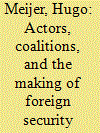

|
|
|
|
|
| Summary/Abstract |
In light of the intertwining logics of military competition and economic interdependence at play in Sino–American relations, this paper examines how the United States has balanced conflicting national security and economic interests in the making of US export control policy on defense-related technology toward China. Relying upon a large body of primary sources (including 170 interviews), it seeks to contribute to the understanding of this strategically sensitive yet neglected area of Sino–American relations. It is shown that, as a consequence of the erosion of the US capacity to control the diffusion of defense-related technology to China in the post-Cold War era, a growing set of actors within the United States has reassessed the security/economic calculus in Washington's relationship with Beijing. Specifically, this coalition advocates the streamlining of export controls to sustain the defense and technological industrial base and thereby maintain American military/technological preeminence vis-à-vis a rising China.
|
|
|
|
|
|
|
|
|
|
|
|
|
|
|
|
| 2 |
ID:
160638


|
|
|
|
|
| Summary/Abstract |
The rise of China has been fuelled by a massive military modernisation programme relying, in large part, on the acquisition of foreign military equipment. The question of how the world’s major powers define their arms transfer policies towards China is therefore crucially important. This article makes two original contributions. First, drawing on neoclassical realism, it proposes an explanatory framework integrating international and domestic factors to explain variations in major powers’ arms transfers. Second, based on a large body of elite interviews and diplomatic cables, it offers the first comprehensive comparison of American, British, French and Russian arms transfer policies towards China since the end of the Cold War.
|
|
|
|
|
|
|
|
|
|
|
|
|
|
|
|
| 3 |
ID:
180835
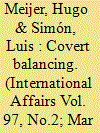

|
|
|
|
|
| Summary/Abstract |
Throughout history, Great Powers have devised balancing strategies aimed at checking the ambitions of rival Great Powers. To do that, they have sought to enter and mobilize alliances and security partnerships with secondary states. Yet, the influence of secondary states on the balancing strategies of Great Powers remains largely under-estimated in the International Relations literature. Contrary to conventional wisdom, we posit that secondary state preferences play a key enabling or constraining role in shaping the balancing choices of Great Powers. We focus specifically on how the adoption of hedging strategies on the part of secondary states affects the balancing strategies of established Great Powers. We argue that when secondary states adopt a hedging strategy established Great Powers are incentivized to engage in what we call ‘covert balancing’. Covert balancing occurs when an established Great Power conceals its security cooperation with a secondary state beneath a cover that is seemingly unrelated to balancing a rising Great Power, thus working around the secondary state's hedging strategy while at the same time helping to generate a latent capacity to balance. We probe our argument by examining US balancing strategy against China in the Asia–Pacific.
|
|
|
|
|
|
|
|
|
|
|
|
|
|
|
|
| 4 |
ID:
177911
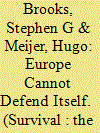

|
|
|
|
|
| Summary/Abstract |
Europe is unable to pool and effectively employ military power due to its lack of an integrated command structure and its deficient C4ISR capacity.
|
|
|
|
|
|
|
|
|
|
|
|
|
|
|
|
| 5 |
ID:
177841
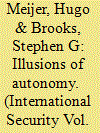

|
|
|
|
|
| Summary/Abstract |
Europe's security landscape has changed dramatically in the past decade amid Russia's resurgence, mounting doubts about the long-term reliability of the U.S. security commitment, and Europe's growing aspiration for strategic autonomy. This changed security landscape raises an important counterfactual question: Could Europeans develop an autonomous defense capacity if the United States withdrew completely from Europe? The answer to this question has major implications for a range of policy issues and for the ongoing U.S. grand strategy debate in light of the prominent argument by U.S. “restraint” scholars that Europe can easily defend itself. Addressing this question requires an examination of the historical evolution as well as the current and likely future state of European interests and defense capacity. It shows that any European effort to achieve strategic autonomy would be fundamentally hampered by two mutually reinforcing constraints: “strategic cacophony,” namely profound, continent-wide divergences across all domains of national defense policies—most notably, threat perceptions; and severe military capacity shortfalls that would be very costly and time-consuming to close. As a result, Europeans are highly unlikely to develop an autonomous defense capacity anytime soon, even if the United States were to fully withdraw from the continent.
|
|
|
|
|
|
|
|
|
|
|
|
|
|
|
|
| 6 |
ID:
177992
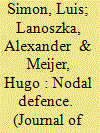

|
|
|
|
|
| Summary/Abstract |
Scholars and pundits alike continue to portray the U.S.-led regional alliance systems in Europe and East Asia in stark, dichotomous terms. Whereas the North Atlantic Treaty Organization is the standard model of multilateralism, the U.S.-led system of bilateral alliances in East Asia is the archetypal ‘hub-and-spokes’ structure in which different allies (the spokes) enjoy deep bilateral strategic ties with Washington (the hub) but not with each other. We argue that these common depictions of U.S.-led alliance systems are obsolete. Instead, we show that what we label ‘nodal defence’ – a hybrid category that combines overlapping bilateral, minilateral and multilateral initiatives – better captures how the U.S.-led alliance systems in Europe and East Asia operate today. Specifically, nodal defence is a hybrid alliance system in which allies are connected through variable geometries of defence cooperation that are organized around specific functional roles so as to tackle different threats. To show how nodal defence is an emerging central feature of the U.S.-led regional alliance systems, we conduct an original cross-regional comparison of how these alliance systems work, drawing on elite interviews, official documents, and secondary literature.
|
|
|
|
|
|
|
|
|
|
|
|
|
|
|
|
| 7 |
ID:
158955


|
|
|
|
|
| Summary/Abstract |
Combining the English School of International Relations and the study of grand strategy decision-making processes, this article investigates how dynamic density – growing volume, velocity, and diversity of interactions within international society – alters states’ strategy formation processes. By contrasting the perspectives of structural realism and the English School on the role of dynamic density in world politics, the piece illustrates the strategist’s dilemma: as global dynamic density in the international society increases, the ability of great powers to formulate coherent grand strategies and policies potentially decreases. Specifically, it contends that growing global dynamic density generates processual and substantive fragmentation in strategy formation. Building on a large body of elite interviews, US policy toward China – and the so-called US ‘rebalance’ to Asia – is used as a probability probe of the central idea of the strategist’s dilemma. In conclusion, we contrast our findings with complex interdependence theory and examine their implications for ‘great power management’ (GPM) as a primary institution of international society. We argue that, by generating processual and substantive fragmentation in strategy formation, global dynamic density complicates GPM by hindering the capacity of great powers to manage and calibrate the competitive and cooperative dynamics at play in a bilateral relationship.
|
|
|
|
|
|
|
|
|
|
|
|
|
|
|
|
| 8 |
ID:
144991


|
|
|
|
|
| Publication |
New York, Oxford University Press, 2016.
|
| Description |
xvii, 391p.hbk
|
| Standard Number |
9780190277697
|
|
|
|
|
|
|
|
|
|
|
|
Copies: C:1/I:0,R:0,Q:0
Circulation
| Accession# | Call# | Current Location | Status | Policy | Location |
| 058648 | 382.640973/MEI 058648 | Main | On Shelf | General | |
|
|
|
|
| 9 |
ID:
167401
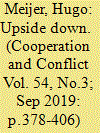

|
|
|
|
|
| Summary/Abstract |
Since the end of the Cold War, the study of European defence has been dominated by a ‘Common Security and Defence Policy (CSDP)-centric’ approach, while largely neglecting the comparative analysis of national defence policies. This article makes a conceptual and empirical case for turning the dominant research prism of European defence studies upside down by returning the analytical precedence to the national level. This approach privileges the comparative analysis of national defence policies and armed forces, before focusing on the trans-/supra-national level. The case for this analytical turn is made in three steps. Firstly, it addresses the different historical stages in European defence integration and the transformation of national armed forces and thereby brings to light the recent renationalization of defence in Europe. Secondly, it questions the predominance of the CSDP in the scholarly literature on European defence. Finally, it seeks to demonstrate the fruitfulness of such a démarche by empirically substantiating common patterns and intra-European divergences in the evolution of national defence policies and armed forces since the end of the Cold War. After having shown the need and added benefit of turning the analytical lense of European defence studies on its head, the conclusion suggests future avenues of research on national defence policies and armed forces in Europe.
|
|
|
|
|
|
|
|
|
|
|
|
|
|
|
|
|
|
|
|
|